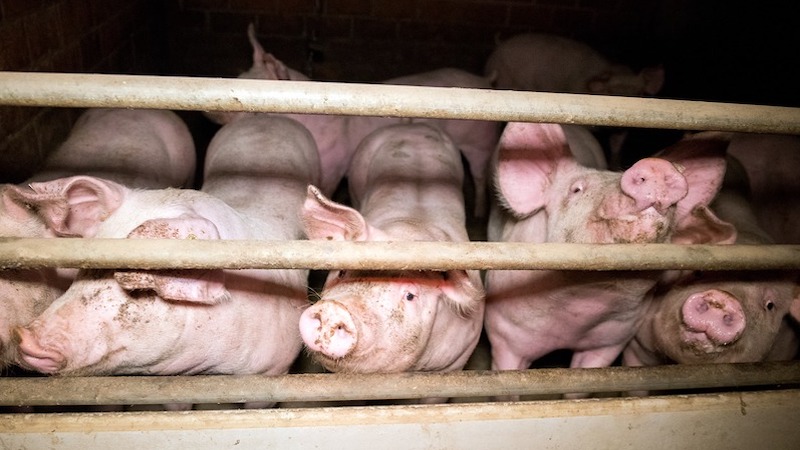As world leaders meet tomorrow in Paris to discuss the role of public finance in addressing “climate change and the global crisis”, delegates should press multilateral development banks (MDBs) to invest in line with the Paris Agreement, including by ending their expansion of factory farming.
Animal agriculture contributes up to a fifth of global greenhouse gas (GHG) emissions, including a third of the world’s methane emissions. Because methane has over 80 times the global warming potential of carbon dioxide (CO2) over a 20-year timeframe, swift and absolute reductions from the livestock sector are vital to keeping the Paris Agreement climate targets within reach.
According to leading researchers, even if fossil fuel emissions were immediately halted, livestock emissions could make it impossible to limit warming to 1.5°C and difficult to limit it to “well below” 2°C.
MDBs livestock investments
Despite this, since 2010, the World Bank and other Multilateral Development Banks (MDBs) have invested over $4.6 billion of public money to help expand large-scale livestock production, exacerbating the climate crisis while also driving deforestation, biodiversity loss, and air and water pollution.
Tomorrow world leaders will meet in Paris for the Summit for a New Global Financing Pact, organized by French President Emmanuel Macron and Barbadian Prime Minister Mia Mottley.
Fossil fuels, planes, ships and shares – What will be taxed for climate funds?
The summit will address key issues, including reform of multilateral development banks, with the goal of “addressing climate change and the global crisis.” Central to such reform should be a commitment by MDBs to end their support for GHG-intensive and highly environmentally destructive industrial livestock operations.
On his first day as World Bank President, Ajay Banga made climate change a clear priority by directing his staff to “double down” on their climate efforts. But words aren’t enough. The World Bank and other MDBs must take concrete steps to preserve the best possibility of limiting global warming to “well below” 2°C. In agriculture, this translates into shrinking, not expanding, the global industrial livestock sector.
Fatal flaws
MDBs are fueling the global expansion of factory farming while failing to account for the sector’s impacts on climate.
In a new report we co-authored on behalf of the Stop Financing Factory Farming Campaign (S3F), we argue that flaws in MDBs’ frameworks for aligning their investments with the Paris Agreement are resulting in the misclassification of industrial livestock investments as compatible with the Agreement’s mitigation and adaptation goals.
A key flaw is that the frameworks are based on countries’ Nationally Determined Contributions (NDCs)–the climate plans they submit to the United Nations Framework Convention on Climate Change (UNFCCC). But the UN’s climate body itself actually finds that NDCs are “not on track to meet climate goals.”
Carbon credits touted as saviour of coal-to-clean energy deals
Equally important, only 40% of countries incorporate livestock into their NDCs, and none have set methane reduction targets from the sector. MDBs’ Paris Alignment frameworks also fail to account for the extreme vulnerability of intensive, highly centralized livestock operations to climate-related heat stress, disease spread, and water shortages.
None of the world’s leading MDBs currently require that industrial livestock sector borrowers provide comprehensive (Scope 1-3) emissions reporting or commit to absolute, time-bound GHG reduction targets.
IFC’s poor record
Even more concerning, a comprehensive analysis by Bank Climate Advisors reveals that the World Bank’s private sector arm, the International Finance Corporation (IFC), has systematically failed to apply its own GHG-related environmental standards which are already insufficient to the task of reducing absolute emissions from industrial livestock production.
Only last month, IFC approved a $32 million loan to Brazilian dairy giant Alvoar Lacteos and a $47 million loan to GXYX, a massive pig farm operation in China, despite civil society concerns and opposition to each. Neither company has committed to comprehensive GHG reporting or reductions or time-bound zero-deforestation targets, and neither has addressed other negative l impacts of value-chain activities, including biodiversity loss from feed production and grazing.
Often, MDBs use arguments about food security and the need to keep food prices low to justify investments in resource-intensive factory farming operations.
In reality, however, a shift away from industrial livestock production toward agroecological systems could more efficiently and equitably feed the planet. These systems prioritize smaller-scale farmers and communities, help facilitate a shift toward sustainable, plant-forward diets, conserve natural resources, and yield significant climate and biodiversity-related benefits.
To honor their commitments to Paris Alignment, MDBs should shift their agricultural investments toward climate-friendly agroecological farming systems that support food sovereignty and food security, and end their investments in intensive, polluting and high-emitting industrial livestock operations. Shifting investments in this way would deliver economic, public health, food security, and climate dividends now and for future generations.
Kelly McNamara is a senior research and policy analyst and Kari Hamerschlag is deputy director of food and agriculture at Friends of the Earth U.S.
